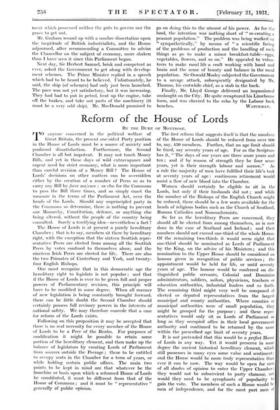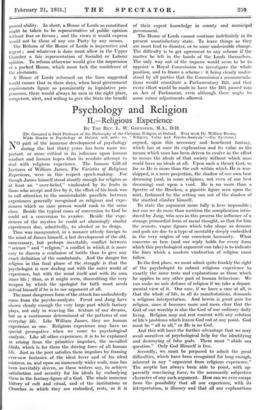Reform of the House of Lords
BY THE DUKE OF MONTROSE.
/10 anyone concerned in the political welfare of Great Britain, the present one-sided Party position in the House of Lords must be a source of anxiety and profound dissatisfaction. Furthermore, the Second Chamber is all but impotent. It may not touch Money Bills, and yet in these days of wild extravagance and urgent need for strict economy, what is more important than careful revision of a Money Bill ? The House of Lords' decisions on other matters can be overridden either by the creation of a number of Peers so as to carry any Bill by force maieure ; or else for the Commons 'to pass the Bill three times, and so simply enact the measure in' the terms of the Parliament Act, over the heads of the Lords. Should any unprincipled party in the Commons so determine, there is nothing to prevent our Monarchy, Constitution, defence, or anything else being altered, without the people of the country being consulted. Surely a terrifying idea—nevertheless a fact !
The House of Lords is at present a purely hereditary Chamber ; that is to say, members sit there by hereditary right, with the exception that the sixteen Scottish repre- sentative Peers are elected from among all the Scottish Peers by votes confined to themselves alone,' and the nineteen Irish Peers are elected for life. There are also the two Primates of Canterbury and York, and twenty- four English Bishops.
One must recognize that in this democratic age the hereditary right to legislate is not popular ; and that if the House of Lords is ever to be given full and proper powers of Parliamentary revision, this principle will have to be modified in some degree. When all manner of new legislation is being constantly brought forward, there can be little doubt the Second Chamber should certainly possess full revisory powers in the interests of national safety. We may therefore concede that a case for reform of the Lords exists.
Following on this proposition it may be accepted that there is no real necessity for every member of the House of Lords to be a Peer of the Realm. For purposes of modification it might be possible to retain some portion of the hereditary element, and then make up the balance of legislators by creating Lords of Parliament from sources outside the Peerage ; these to be entitled to occupy seats in the Chamber for a term of years, or while holding certain public offices. The main two points to be kept in mind are that whatever be the franchise or basis upon which a reformed House of Lords be constituted, it must be different from that of the House of Commons ; and it must be " representative " generally of public opinion. The first reform that suggests itself is that the numbers of the House of Lords should be reduced from over 600 to, say, 450 members. Further, that an age limit should be fixed, say seventy years of age. For as the Scripture has it, " The days of our years are three score years and ten ; and if by reason of strength they be four score years, yet is their strength labour and sorrow." As a rule the majority of men have fulfilled their life's task at seventy years of age : continuous retirement would assist a flow of new blood into the Chamber.
Women should certainly be eligible to sit in the Lords, but only if their husbands did not ; and while the number of the Bishops of the English Church might be reduced, there should be a few seats available for the heads of religious bodies such as the Church of Scotland, Roman Catholics and Nonconformists.
So far as the hereditary Peers arc concerned, they should all be elected from among themselves, as is now done in the case of Scotland and Ireland ; and their numbers should not exceed one-third of the whole House. Of the remaining two-thirds it would seem right that one-third should be nominated as Lords of Parliament by the King, on the advice of his Ministers ; and this nomination to the Upper House should be considered an honour given in recognition of public services ; the appointment would be held for life, or until seventy years of age. The honour would be conferred on dis- tinguished public servants, Colonial and Dominion administrators, soldiers, sailors, physicians, teachers or education authorities, industrial leaders and no forth. The remaining third might very well be composed of elected or deputed representatives from the largest municipal and county authorities. Where counties or municipal authorities were of small population, they might be grouped for the purpose ; and these repre- sentatives would only sit as Lords of Parliament so long as they occupied office in their local government authority and continued to be returned by the same within the prescribed age limit of seventy years.
It is not pretended that this would be a perfect House of Lords in any way. Yet it would preserve in some degree the ancient historical hereditary element, which still possesses in many eyes some value and sentiment; and the House would be more truly representative than ever it can be now. The way would be open for men of all shades of opinion to enter the Upper Chamber; they would not be subservient to party clamour, nor would they need to be sycophants of popularity to gain the vote. The members of such a House would be men of independence, and for the most part men of proved ability. In short, a House of Lords so constitued might be taken to be representative of public opinion without fear or favour ; and the views it would express would not be those of any one Party by any means.
The Reform of the House of Lords is imperative and urgent ; and whatever is done must allow in the Upper Chamber a fair representation of Socialist or Labour opinion. To reform otherwise would give the impression of a packed House, which must lack the confidence of the electorate.
A House of Lords reformed on the lines suggested would ensure that in these days, when local government requirements figure so prominently in legislative pro- grammes, there would always be men in the right place, competent, alert, and willing to give the State the benefit of their expert knowledge in county and municipal government.
The House of Lords cannot continue indefinitely in its present unsatisfactory state. To leave things as they are must lead to disaster, or to some undesirable change. The difficulty is to get agreement to any scheme if the matter be left in the hands of the Lords themselves. The only way out of the impasse would seem to be to appoint a Royal Commission to investigate the whole position, and to frame .a scheme ; it being clearly under- stood by all parties that the Commission's recommenda- tions would constitute a Parliamentary Bill, and that every effort would be made to have the Bill passed into an Act of Parliament, even although there might be some minor adjustments allowed.












































 Previous page
Previous page